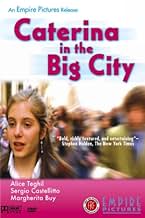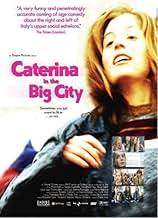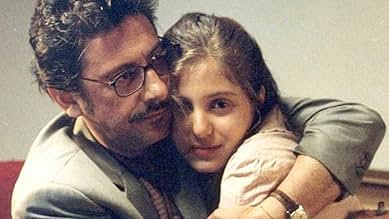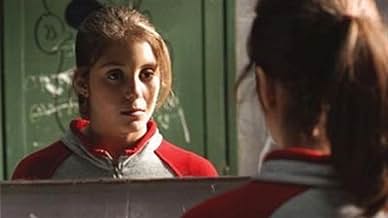CALIFICACIÓN DE IMDb
6.8/10
3.3 k
TU CALIFICACIÓN
Agrega una trama en tu idiomaCaterina, forced to leave her small town at the age of thirteen, faces the complications of living in the big metropoly of Rome.Caterina, forced to leave her small town at the age of thirteen, faces the complications of living in the big metropoly of Rome.Caterina, forced to leave her small town at the age of thirteen, faces the complications of living in the big metropoly of Rome.
- Dirección
- Guionistas
- Elenco
- Premios
- 7 premios ganados y 9 nominaciones en total
Zach Wallen
- Edward
- (as Zach -James Smith- Wallen)
Margerita Mazzola
- Martina
- (as Margherita Mazzola)
Martina Tasquetta
- Alessia
- (as Martina Taschetta)
Giulia Gorietti
- Giada
- (as Giulia Elettra Gorietti)
- Dirección
- Guionistas
- Todo el elenco y el equipo
- Producción, taquilla y más en IMDbPro
Opiniones destacadas
I am a student in Australia, in year 9, 15 years old, studying Italian at LaSalle Catholic College Bankstown. I viewed this film as an excursion 3 days ago, and I loved it. I feel for Caterina because I guess I am a little naive in a way. She didn't realize that people were using her, she didn't realize that Margherita liked her in a different, more romantic way, she didn't know about a lot that went on in Rome. It was a very nice, dramatic and funny storyline, and i suppose it appeals to a large audience. I rated it 9/10. I took off 1 mark because I feel not enough was shown of Edward, the guy she loved, the guy from "down under", the guy who most Australians can identify with. He played a prime role in my eyes because he brought her life back on track when she had run away. A little more could have also been shown of Fabietto and Agata's relationship. This film was an excellent representation of the comparison between the posh side of Italy and the grateful and appreciative side of Italy
Caterina gives us an opportunity to feel and a chance to hope. A young girl both naive and somehow mature, she is unsure of what she wants in life. Her task is learning to navigate the waters of a high school in Rome where she is the new girl from the sticks when her father is transfered from a small town on the coast. He fulfills his dream of returning to the cultural mecca of the capital where he hopes to take his "rightful" place among the intelligentsia. But the film turns on just this point"rightful place". There are no simple answers, though we do have an opportunity to see how complex it is to find one's place, rightful or not, in the world. Caterina is something of a metaphor for the Italian populace at large, I would think. But she is more than this. There is something about her story that touched me, several decades and half a world away from the world she inhabits, a world stratified by cliques and patronage, prejudice and injustice...a world very much like the one I live in and the one I imagine most of us live in. Caterinaas the film that bears her namedoes not take the easy way out in running away or self-repression or living a life of quiet desperation, even when her sheltered provincial upbringing and less-than-ideal family situation do not give her any clues on how to deal with her new life and classmates from prominent families. She tries to adjust to the fast-pace and superficiality of life in the Italian capital, and much of the fun of the movie is seeing her in the various situations she encounters along the way. Her father is great as the frustrated writer with no talent and a loud voice, a self-important boor. My heart goes out to all the Caterinas of the world, who go forward with optimism and pure heart even when they know the odds are against them.
I think Virzì is one of the most interesting director in Italy, at the present moment. His ability to portray the current Italian society is quite good, and he achieves this either with *characters* (the two families in "Ferie d'Agosto", the father in "Caterina va in città") and with *stories* (the story of "Ovosodo", a bit of an Italian "It's a wonderful life"... just a bit, obviously... :-).
"Caterina va in città" is a good movie: the idea of showing chunks of the Italian society and habits through the eyes of an innocent teenager gives the movie a "fairy tale" twist that makes it really "light" and enjoyable. I also liked the mom's character, played by a really good and beautiful Margherita Buy: in general, I appreciated Virzì's idea that the "good" part of society is based on the strength of women, as all male characters in this movie either are donquixotesque losers or spoiled and arrogant over-grown babies.
But, as for most of his movies, I think the same criticism again apply: Virzì is openly a left-wing director, but he stresses this a bit too much and sometimes its works sound too "ideological": art should make you think, not tell you what to think, I guess. In addiction, some characters are too stereotypical and don't come out of a really deep psychological analysis. Still, I think he is currently the director who knows best how to take on the screen what goes on in Italy.
In conclusion, I think this movie - just like "Ovosodo" - is based on a simple yet powerful assumption: that happiness is the disease of the idiots...
"Caterina va in città" is a good movie: the idea of showing chunks of the Italian society and habits through the eyes of an innocent teenager gives the movie a "fairy tale" twist that makes it really "light" and enjoyable. I also liked the mom's character, played by a really good and beautiful Margherita Buy: in general, I appreciated Virzì's idea that the "good" part of society is based on the strength of women, as all male characters in this movie either are donquixotesque losers or spoiled and arrogant over-grown babies.
But, as for most of his movies, I think the same criticism again apply: Virzì is openly a left-wing director, but he stresses this a bit too much and sometimes its works sound too "ideological": art should make you think, not tell you what to think, I guess. In addiction, some characters are too stereotypical and don't come out of a really deep psychological analysis. Still, I think he is currently the director who knows best how to take on the screen what goes on in Italy.
In conclusion, I think this movie - just like "Ovosodo" - is based on a simple yet powerful assumption: that happiness is the disease of the idiots...
'Caterina va in citta' ('Caterina in the Big City') is an Italian film that takes as its storyline the coming of age of a young teenager transported by her family from the quiet Tuscany seaside village of Montaldo Di Castro to the challenging realities of Big City Rome, but that is only the means to an end of exploring Italian politico-social life and its effects on the youth of today. It comes very close to drowning in its own excesses, but at the root of the film is a sensitive tale of a young girl's struggles with growing into an adulthood that puzzles, frightens and challenges her.
Caterina (Alice Teghil) finds her greatest moments of happiness in her home town singing mezzo soprano in the choir: simple pleasures in a simple setting surrounded by country folk content to live life day to day. Her father Giancarlo (Sergio Castellitto) is a teacher who can't hold a job, partially because he is so outspoken and partially because he is a raving truly obnoxious person. Her mother Agata (Margherita Buy) is subservient, a woman with few coping mechanisms who allows her odious husband to run an abusive household. Giancarlo's aunt is ill in Rome and with the idea of finding a job where his talents are respected, Giancarlo uproots his little family and moves to the big city. There the social castes are evident and Caterina is judged a country hick until she is befriended by first a rebel who bonds with Caterina, introduces her to tattoos and liquor, and causes a schism between her important mother (Giancarlo hoped to have is novel published by the woman), the daughter and his family. Caterina then is absorbed into the rich and spoiled rank and file of the wealthy, not fitting in until the girls do a make over. That situation is again disrupted by Giancarlo's blindly inappropriate behavior. The true Caterina is somehow lost, still dreaming of becoming a fine mezzo soprano, but tagging along with the crowd du jour. Ultimately Giancarlo's multiple and consistent failures drive him away from the family, he rides off to oblivion on his restored motorbike, and Agata and Caterina both bloom.
The noise level of this film is such that it is difficult to watch: the young girls means of communication is a mixture of screaming, loud talking, and fighting and otherwise making us uncomfortable. Yet underneath all of the political and social expose and brandishing is a truly wonderful young Caterina whose life as a soap opera is watched tenderly by an Australian boy who plays the guitar and observes her family from a window across the way from Caterina's Rome home. The moments toward the end of the film when the playback comes justifies the fuss of getting there.
This is not a film this viewer would sit through again, but reflecting on the story after all the commotion is over, hearing Mozart's 'Ave Verum Corpus' and Verdi's 'Nabucco" etc as the inspiration behind Caterina's honest dreams, makes is a more memorable experience. In Italian with English subtitles. Grady Harp
Caterina (Alice Teghil) finds her greatest moments of happiness in her home town singing mezzo soprano in the choir: simple pleasures in a simple setting surrounded by country folk content to live life day to day. Her father Giancarlo (Sergio Castellitto) is a teacher who can't hold a job, partially because he is so outspoken and partially because he is a raving truly obnoxious person. Her mother Agata (Margherita Buy) is subservient, a woman with few coping mechanisms who allows her odious husband to run an abusive household. Giancarlo's aunt is ill in Rome and with the idea of finding a job where his talents are respected, Giancarlo uproots his little family and moves to the big city. There the social castes are evident and Caterina is judged a country hick until she is befriended by first a rebel who bonds with Caterina, introduces her to tattoos and liquor, and causes a schism between her important mother (Giancarlo hoped to have is novel published by the woman), the daughter and his family. Caterina then is absorbed into the rich and spoiled rank and file of the wealthy, not fitting in until the girls do a make over. That situation is again disrupted by Giancarlo's blindly inappropriate behavior. The true Caterina is somehow lost, still dreaming of becoming a fine mezzo soprano, but tagging along with the crowd du jour. Ultimately Giancarlo's multiple and consistent failures drive him away from the family, he rides off to oblivion on his restored motorbike, and Agata and Caterina both bloom.
The noise level of this film is such that it is difficult to watch: the young girls means of communication is a mixture of screaming, loud talking, and fighting and otherwise making us uncomfortable. Yet underneath all of the political and social expose and brandishing is a truly wonderful young Caterina whose life as a soap opera is watched tenderly by an Australian boy who plays the guitar and observes her family from a window across the way from Caterina's Rome home. The moments toward the end of the film when the playback comes justifies the fuss of getting there.
This is not a film this viewer would sit through again, but reflecting on the story after all the commotion is over, hearing Mozart's 'Ave Verum Corpus' and Verdi's 'Nabucco" etc as the inspiration behind Caterina's honest dreams, makes is a more memorable experience. In Italian with English subtitles. Grady Harp
I wish I could say that this was a great film because there really were a lot of things that one could like about it.
As it turns out, however, it is a good, but flawed film. I will give this film a recommendation, I think it is worth seeing.
The film made a number of incredible social statements. It really cuts to the quick about the nature of society, the people who can manipulate the system on both sides are in collusion with each other to keep their privilege. The people who are on the outside find themselves on the outside, looking in. They can be taken under someone's wing but they are never really more then a pet, the Jimmy Olsen to someone's Superman.
The film had spectacular acting, particularly from the lead.
So what then keeps the film from being great? One of the biggest problems comes from the episodic and picaresque structure of the film. It has the kind of structure that is more interesting because of its discontinuity then because of its continuity. And while it makes for a lot of interesting discussions, this could turn a lot of people off, probably even more then the subtitles.
Honestly, the problem is that it begins with Caterina being pulled in many directions and it allows us to see facets of her through these different social lenses. The trouble is that we never get a baseline reading on her in the beginning before she moves to Rome. This is done very well but we never get the impression of her as anything more then a tablet that the ideologies of others are being written on, even at the end of the film when she supposedly finds herself. I won't give a spoiler as to how but the ending that someone else commented was her in her element is really just another case of this.
You know what, I've changed my mind. This is a wonderful film to watch. Its a spectacular way to look at what life is really like when you are outside the powerful and privileged circles of society and you can only be influenced by the ideologies of others but you really lack any voice of your own.
Watch this along with Welcome to the Dollhouse and see what life was like for the rest of us. Let this film show you the social cliques, collusion and ideology and let Solondz show you the sheer cruelty of a society that, as J. G. Ballard said, normalized psychopathy. And see it for what it really is, not some sugarcoated network television version (I think you guys know what very popular television series I'm talking about).
As it turns out, however, it is a good, but flawed film. I will give this film a recommendation, I think it is worth seeing.
The film made a number of incredible social statements. It really cuts to the quick about the nature of society, the people who can manipulate the system on both sides are in collusion with each other to keep their privilege. The people who are on the outside find themselves on the outside, looking in. They can be taken under someone's wing but they are never really more then a pet, the Jimmy Olsen to someone's Superman.
The film had spectacular acting, particularly from the lead.
So what then keeps the film from being great? One of the biggest problems comes from the episodic and picaresque structure of the film. It has the kind of structure that is more interesting because of its discontinuity then because of its continuity. And while it makes for a lot of interesting discussions, this could turn a lot of people off, probably even more then the subtitles.
Honestly, the problem is that it begins with Caterina being pulled in many directions and it allows us to see facets of her through these different social lenses. The trouble is that we never get a baseline reading on her in the beginning before she moves to Rome. This is done very well but we never get the impression of her as anything more then a tablet that the ideologies of others are being written on, even at the end of the film when she supposedly finds herself. I won't give a spoiler as to how but the ending that someone else commented was her in her element is really just another case of this.
You know what, I've changed my mind. This is a wonderful film to watch. Its a spectacular way to look at what life is really like when you are outside the powerful and privileged circles of society and you can only be influenced by the ideologies of others but you really lack any voice of your own.
Watch this along with Welcome to the Dollhouse and see what life was like for the rest of us. Let this film show you the social cliques, collusion and ideology and let Solondz show you the sheer cruelty of a society that, as J. G. Ballard said, normalized psychopathy. And see it for what it really is, not some sugarcoated network television version (I think you guys know what very popular television series I'm talking about).
¿Sabías que…?
- TriviaSara Pallini's debut.
- ErroresThe story begins in 2003, but the dates do not match up with the days of the week for that year.
- ConexionesReferences Los hermanos caradura (1980)
- Bandas sonorasInno ufficiale dei giovani fascisti
Music by Giuseppe Blanc and lyrics by Vittorio E. Bravetta
Sung at the wedding reception
Selecciones populares
Inicia sesión para calificar y agrega a la lista de videos para obtener recomendaciones personalizadas
- How long is Caterina in the Big City?Con tecnología de Alexa
Detalles
Taquilla
- Total en EE. UU. y Canadá
- USD 296,464
- Fin de semana de estreno en EE. UU. y Canadá
- USD 9,352
- 5 jun 2005
- Total a nivel mundial
- USD 4,407,426
- Tiempo de ejecución
- 1h 47min(107 min)
- Color
- Mezcla de sonido
- Relación de aspecto
- 2.35 : 1
Contribuir a esta página
Sugiere una edición o agrega el contenido que falta










